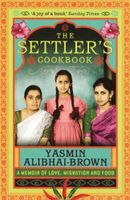Label
All
0
Clear all filters
Prue Leith's latest book is now on ckbk. Get 25% off ckbk Membership
Born in Elysium, 1920s–54
Appears in
Published 2009
MY MOTHER, JENA, WAS raised in the coastal town of Dar-es-Salaam, meaning ‘Abode of Peace’ in Arabic. Like Mombasa, it was a cliché of seaside gorgeousness but more languid. The lobsters and crabs, she said, were slow of movement, and birds slothfully hung around on trees most of the hot day. The sea was part of the music of her soul; her favourite Hindi song was about the sound of melancholy waves leaving traces of sadness on the sand.
Her father had made good, and was kind and generous, she was told by those who knew him, a man who valued humanity and God equally, a radical position for those times. Then disease took away both her parents. Jena and her younger brother Pilu were orphaned too young. Graveyards in the tropics are full of such premature deaths. There were no photographs or images to give shape to the sense of loss the siblings must have felt. Jena spent her whole life peering at family faces, seeking clues and signs so she could construct identikit images of her mother, Puribai, and father, Ramji. When her granddaughters were born, Jena always said, excitedly, ‘I dreamt she is my own mother returned – her face must be my mother’s face. Look at her, pretty nose, she doesn’t look like any of us, must be my mother.’
Become a Premium Member to access this page
Unlimited, ad-free access to hundreds of the world’s best cookbooks
Over 150,000 recipes with thousands more added every month
Recommended by leading chefs and food writers
Powerful search filters to match your tastes
Create collections and add reviews or private notes to any recipe
Swipe to browse each cookbook from cover-to-cover
Manage your subscription via the My Membership page
Best value
In this section
Advertisement
Advertisement
The licensor does not allow printing of this title


